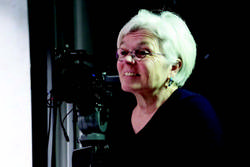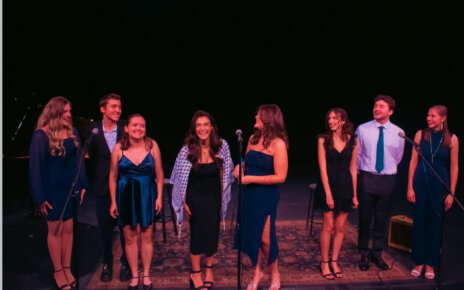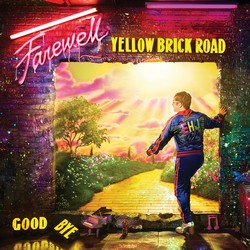A captivated audience got the chance to watch the powerful documentary Trust: Second Acts in Young Lives on Sept. 12 at Pollak Theatre and had the chance to hear from the director herself, Nancy Kelly, as part of “On Screen, In Person.”
Trust was the first film on campus for “On Screen, In Person” where filmmakers’ works are presented followed by a Q & A. This was sponsored by the Department of Communication, the Performing Arts Series, and funded by the National Endowment of the Arts’ Regional Touring Program.
Kelly’s documentary followed Marlin, an 18yearold Honduran immigrant whose life has been anything but simple. She was raped as a young girl at church while going to the bathroom and then continuously abused by her brother, Carlos, as they came to America.
Depressed and suicidal, Marlin went to a hospital where a counselor told her about Albany Park Theater Project (APTP) in Chicago, where group members have their hardships recreated through live performances.
As Marlin works with APTP, she confronts the difficulties in her life as others act them out, finding comfort with her fellow performers and directors.
Chad Dell, chair of the Department of Communication, welcomed the crowd and said “On Screen, In Person” is a film series held around the East Coast. He said six films and filmmakers will come to campus with three films each semester.
He also said Trust’s themes are tough and Lynne Lehrkinder, LPC, of Counseling and Psychological Services was present if anyone needed to talk.
Next, Donna Dolphin, Communication professor, said, “To see you turn out so early in the semester is great.” She then introduced Kelly and her filmography to the crowd. She said Kelly comes from San Francisco and has been making films for 30 years.
Dolphin also said that her film, Smitten, has been widely broadcasted on the Independent Television Station a total of 125 times and described her work as “very interesting.”
Dolphin said Trust took a little over four years to produce and that Kelly would be present for any questions.
Before the film, Kelly, who has been in seven cities on a two week tour, thanked the crowd and said, “It’s fun to connect with audiences in all these cities.” She also said Trust is part of a trilogy that included films like Downside Up, which looked “at the power of arts in communities.”
Trust worked because Kelly focused on Marlin and how she would overcome her past. During the Q & A, Kelly said this story wasn’t really coming together until Marlin’s story telling. After Marlin described her story to a circle of APTP members and directors, she understood there are people who not only care but can help.
Kelly showcased the strength of Marlin and everyone in APTP, despite the difficulties they have faced. For example, one boy in the troupe, Jose, played Carlos in Marlin’s play and described how tough it was to play the abusive brother since his sister in real life was raped. Kelly showed how everyone working together can assist in defeating past demons. All the kids are so brave in their ability to not only deal with their own problems but to hear other’s stories and to help any way possible.
Together they show that no person’s story is more important than another’s.
While the kids are the central focus, Kelly also acknowledged the adults, who understand what APTP really means. When David Feiner (producing artistic director and cofounder of APTP with his late wife,
Laura Wiley), Maggie Popadiak (associate director), and their musical director discuss an approach to Marlin’s story, the viewers see a strong desire to get this right in what would be titled, Remember Me Like This.
Kelly also displayed how David and Maggie knew what APTP meant. For David, it kept his wife’s memory alive by offering kids this dramatic outlet for pain while Maggie actually had her own story told in APTP as a teen. These facets show how APTP not only helped them but healed others.
Marlin’s story and the entire APTP crew show the creative process of theater and how it is intensely collaborative. As the kids slowly start to practice for the play, we see how their devotion to tell this story grows. Kelly also does well presenting the finished play with all its lighting and staging to give the viewer a sense of fulfillment regarding what was being worked on.
A fascinating aspect of the film is the editing by Yenji Yamamoto, Kelly’s husband. The storyline goes back and forth through time, from Marlin’s storytelling to the final production. What makes this interesting is how at one point, the audience saw a scene be set up and then witness it actually happening on stage.
Trust gave the audience a feeling of participation as if being in the room with these performers and directors taking what’s on the page and translating it to the stage.
The subject matter can be tough, but Kelly demonstrated that without it, viewers couldn’t see how much stronger people like Marlin can be with the right support.
Dell moderated the Q & A where a woman in the audience said, “I feel incredibly transformed. I felt like I was a part of the experience.” A female theater major in the audience asked Kelly about being a part of this theater family. Kelly said, “Although people didn’t like the production crew, they made me feel like a part of their family. In theater, there is a sense of being a family.”
Andrew Demirjian, specialist professor, from the Department of Communication, asked about Kelly’s filmmaking process and its structure. Kelly said she first had the idea in 2003 and it didn’t premiere until October 2010. “I thought one of the reasons we were failing at first was because we weren’t there for the storytelling,” Kelly said. In the end, she said she had 150 hours of material.
As for the editing, she said Yamamoto “has a terrific editorial mind and brought the idea to not make this chronological.”
When The Outlook asked if there was ever a time she had to walk away, Kelly simply said no. “I never felt the need to walk away,” Kelly said.
With a last glance for questions, Kelly thanked the crowd and wished all a good night.
Kara Donnelly, a University senior, was a student in attendance and said, “I was surprised by what it was about, and I think a lot of people should see it.” Meanwhile, Jill Benanti, a University senior, also said that seeing the director and asking questions was a nice factor to this series. “I like to watch documentaries, and it was interesting to watch it with the person who made it,” she said.
The next “On Screen, In Person” movie will be The Little Town of Bethlehem on Oct. 10 in Wilson Auditorium and In Good Times: The Piano Jazz of Marian McPartland on Nov. 7.
PHOTO COURTESY of documentaries.org




